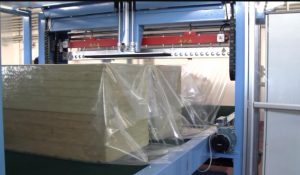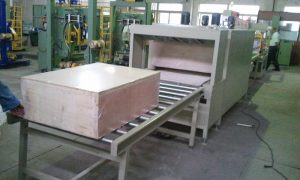Enhancing Panel Protection: An Overview of Automatic Shrink Wrap Machines
Protecting large, flat products like architectural, solar, or furniture panels during storage and transportation is crucial in many fabrication and manufacturing sectors. Damage from moisture, dust, or abrasion can lead to costly rejects or repairs. Automatic panel shrink wrap machines provide an efficient solution by encasing panels in a durable, protective layer of heat-shrunk plastic film. This overview details the operation, features, and applications of these essential packaging systems.
Demonstrations of Panel Shrink Wrapping
The following videos illustrate typical automatic panel shrink wrap machines in operation, showcasing the process from infeed to the finished wrapped product.
Operational Process Explained
An automatic panel shrink wrap machine streamlines the packaging process through a sequence of automated steps, typically managed via PLC (Programmable Logic Controller) and HMI (Human-Machine Interface) systems:
- Infeed: Panels are automatically fed onto the machine's conveyor system, ensuring proper alignment for wrapping. Bundles of panels can also be processed depending on the machine's configuration.
- Film Application: The machine dispenses the appropriate amount of shrink film (e.g., Polyolefin, PVC) from a roll, draping it over and around the panel.
- Sealing and Cutting: Sealing bars create a secure seam around the panel, enclosing it within the film. Excess film is automatically cut away.
- Heat Shrinking: The enclosed panel moves through an integrated heat tunnel. Controlled hot air circulation causes the film to shrink tightly and conform to the shape of the panel, creating a secure, protective layer.
- Cooling and Outfeed: After exiting the heat tunnel, the wrapped panel may pass through a cooling station to quickly set the film. It is then discharged from the machine, ready for storage or shipping.

panel shrink wrapping machine Key Features and Technological Aspects
Modern panel shrink wrap machines incorporate several features designed for efficiency, flexibility, and reliability:
- Automation: Fully automatic operation minimizes manual labor requirements and ensures consistent wrapping quality. PLC and touchscreen HMI allow for easy setup, operation monitoring, and parameter adjustments.
- High Throughput: Engineered for production environments, these machines can achieve significant packing speeds, varying based on panel size and film type.
- Versatility: Capable of handling various panel dimensions (length, width, height) and compatible with different types and thicknesses of shrink film.
- Precision Sealing: Advanced sealing systems ensure strong, reliable seals for package integrity.
- Efficient Heat Tunnel: Optimized airflow and temperature control within the shrink tunnel provide uniform shrinkage without damaging the panel or the film.
- Safety Mechanisms: Equipped with standard safety features like emergency stops, protective guards, and sensors to ensure operator safety.
Applications Across Industries
Panel shrink wrap machines are utilized in diverse sectors where protection of large, flat items is paramount:
- Renewable Energy: Essential for packaging solar panels. The tight shrink wrap shields photovoltaic cells and electrical components from moisture, dust, debris, and potential scratches during global shipping and handling, preserving panel efficiency and integrity.
- Building Materials and Construction: Protects architectural panels (e.g., decorative facades, insulation boards, wall panels) from environmental damage and abrasion during transit to construction sites. The wrap maintains the product's aesthetic and functional quality until installation.
- Furniture and Woodworking: Used to wrap large flat-pack furniture components, countertops, doors, or sheet wood materials, preventing surface damage and keeping bundled kits together.
- Electronics: Provides protection for large flat-screen displays, monitors, or sensitive electronic backplanes against static, dust, and moisture infiltration during warehousing or shipment.
Example Technical Parameters
The specifications below represent typical capabilities of automatic panel shrink wrap machines. However, these parameters do not necessarily match the specific equipment shown in the videos. For exact machine specifications, direct consultation with equipment providers is recommended.
- Machine Type: Automatic Panel Shrink Wrap Machine
- Panel Size Compatibility (Typical Range):
- Length: up to 2500mm
- Width: up to 1200mm
- Film Type Compatibility: Polyolefin, PVC, and other industry-standard shrink films
- Packaging Speed: Variable, potentially up to 15 panels/hour or higher depending on configuration and panel size
- Film Thickness Range: 12-35 microns (or as specified)
- Power Requirements (Example): 380V, 50Hz, three-phase
- Approximate Machine Dimensions:
- Length: 7200mm
- Width: 2400mm
- Height: 2200mm
- Approximate Machine Weight: 1600kg
- Safety Features: Includes emergency stop circuits, interlocked guards over hazardous areas.
- Control System: PLC with touchscreen HMI for operational control and diagnostics.

Further Information
For details on related packaging technologies and equipment configurations, refer to the following resources:
- Information on Shrinking Machines
- More about Panel Packing Machines
